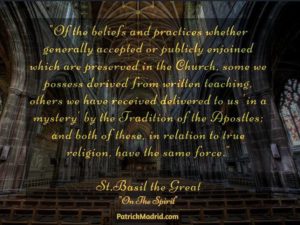Earlier today I retweeted Ligon Duncan’s recommendation of Dr. Needham’s fine little book of daily readings from early church fathers. Well, (Roman Catholic Apologist) Patrick Madrid follows me on Twitter (as I follow him), and he replied that he surely hopes people will read the early Fathers! I replied with a quotation from Gregory of Nyssa on sola scriptura:
“..we make the Holy Scriptures the canon and the rule of every dogma; we of necessity look upon that, and receive alone that which may be made conformable to the intention of those writings.” (On the Soul and Resurrection).
He replied with the graphic I am posting in this article (above). Looks pretty good, doesn’t it? As soon as I saw it I was struck once again by the fact that our Roman Catholic apologist friends really seem content to simply repeat the same arguments, even when they’ve been dealt with…for decades. You see, I gave that very quotation in the book ‘Sola Scriptura: the Protestant Position on the Bible’, first published in 1995—22 years ago. Here is what I wrote:
Surely here we have the Roman position, do we not? Basil here posits an extrabiblical tradition that would fit quite nicely with Trent, would, it not? We see again the importance of looking at all the data, for both the context and the greater scope of Basils teaching contradict such a conclusion. First, we note the continuation of his words, which are often not included in the citation:
For instance, to take the first and most general example, who is there who has taught us in writing to sign with the sign of the cross those who have trusted in the name of our Lord Jesus Christ? What writing has taught us to turn to the East at the prayer? Which of the saints has left us in writing the words of the invocation at the displaying of the bread of the hucharist and the cup of blessing? For we are not, as is well known, content with what the apostle or the Gospel has recorded, but both in preface and conclusion we add other words as being of great importance to the validity of the ministry and these we derive from unwritten teaching. Moreover we bless the water of baptism and the oil of the chrism, and besides this the catechumen who is being baptized. On what written authority do we do this? Is not our authority silent and mystical tradition? Nay, by what written word is the anointing of oil itself taught? And whence comes the custom of baptizing thrice?
No matter how we might view Basil’s beliefs, one thing is certain: the matters that he lists as being addressed by tradition are not the matters that Rome would have us to believe comprise its oral tradition. Basil is talking about traditions with reference to practices and piety.
Ironically Rome does not believe Basil is correct in his claims in this passage. Does Rome say we must face to the East at prayer? Does Rome insist upon triune baptism after the Eastern mode? Yet these are the practices that Basil defines as being derived from tradition. What is more, other statements from this same father fly in the face of the Roman claims, for example, when addressing truly important doctrinal truths, such as the very nature of God, Basil did not appeal to some nebulous tradition. How could he, especially when he encountered others who claimed that their traditional beliefs should be held as sacred? Note his words to Eustathius the physician:
Their complaint is that their custom does not accept this, and that Scripture does not agree. What is my reply? I do not consider it fair that custom which obtains among them should be regarded as a law and rule of orthodoxy. If custom is to be taken in proof of what is right, then it is certainly competent for me to put forward on my side the custom which obtains here. If they reject this, we are clearly not bound to follow them. Therefore let God-inspired Scripture decide between us; and on whichever side be found doctrines in harmony with the word of God, in favor of that side will be cast the vote of truth.
This mis-use of Basil has been refuted by the mere reference to the immediate context in my own published works for 22 years….yet Patrick Madrid is still quoting the same text! Well, not much has changed, that’s for sure! So while the graphic and the a-contextual quote looks real good, just a little homework once again exposes the fact that Rome’s use of patristic sources is, well, quite predictable.


